University Report: Impact of Leadership on Organizational Performance
VerifiedAdded on 2021/04/17
|25
|5162
|236
Report
AI Summary
This report investigates the significant impact of leadership on organizational performance. It begins with an abstract and table of contents, followed by an introduction that outlines the problem statement, research objectives, and research question. The literature review explores the relationship between leadership, honesty, communication, decision-making, and organizational performance, examining various leadership styles and their effects. The methodology section details the research philosophy, approach, design, data collection, and analysis plan. The data analysis and discussion chapter presents correlation and regression analyses, along with a normality plot. The conclusion, recommendations, limitations, and suggestions for future work are also provided. The report utilizes secondary quantitative data to assess the impact of leadership on organizational performance, offering valuable insights and recommendations for future studies. The report is a comprehensive analysis of leadership's influence on business outcomes and employee behavior.
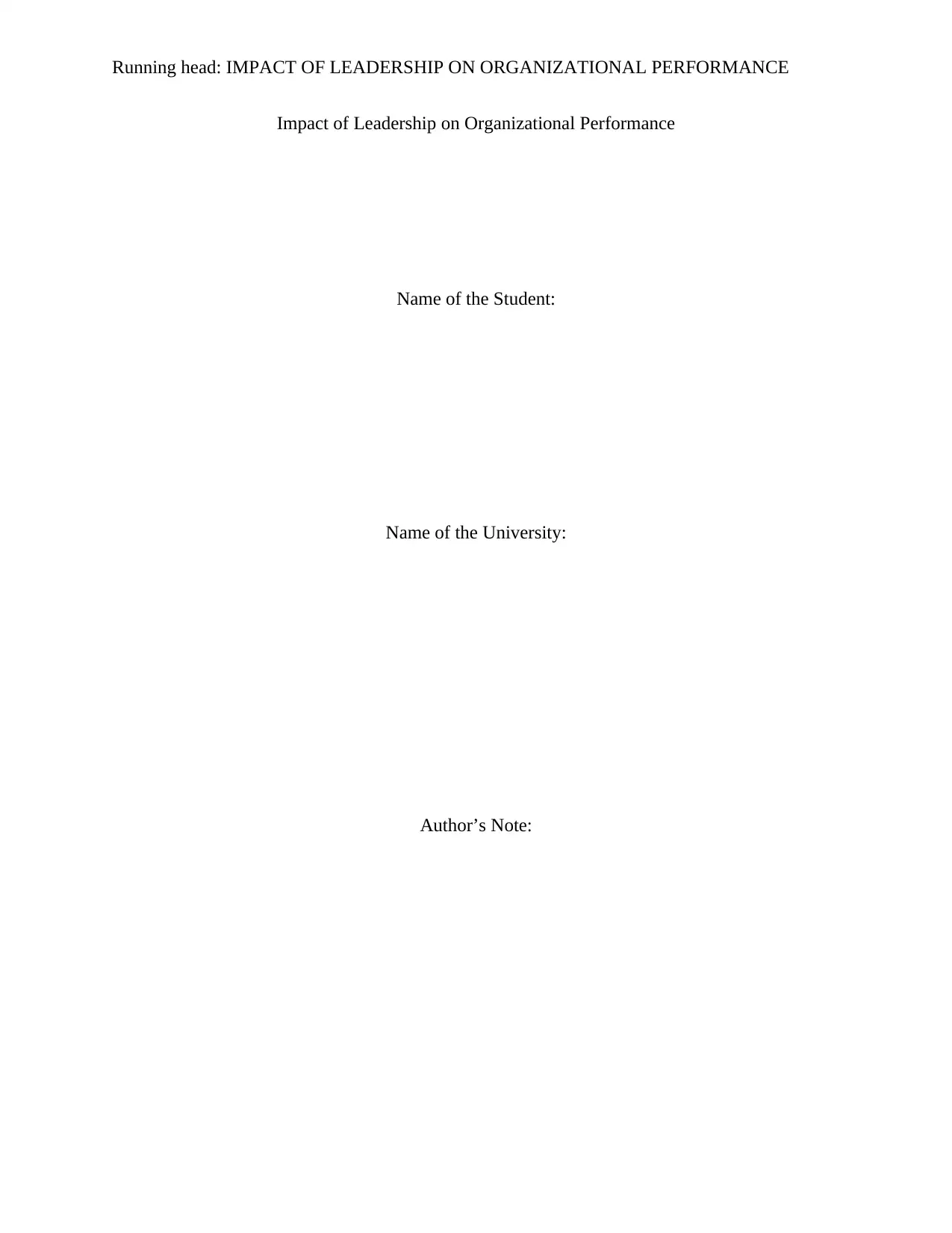
Running head: IMPACT OF LEADERSHIP ON ORGANIZATIONAL PERFORMANCE
Impact of Leadership on Organizational Performance
Name of the Student:
Name of the University:
Author’s Note:
Impact of Leadership on Organizational Performance
Name of the Student:
Name of the University:
Author’s Note:
Paraphrase This Document
Need a fresh take? Get an instant paraphrase of this document with our AI Paraphraser
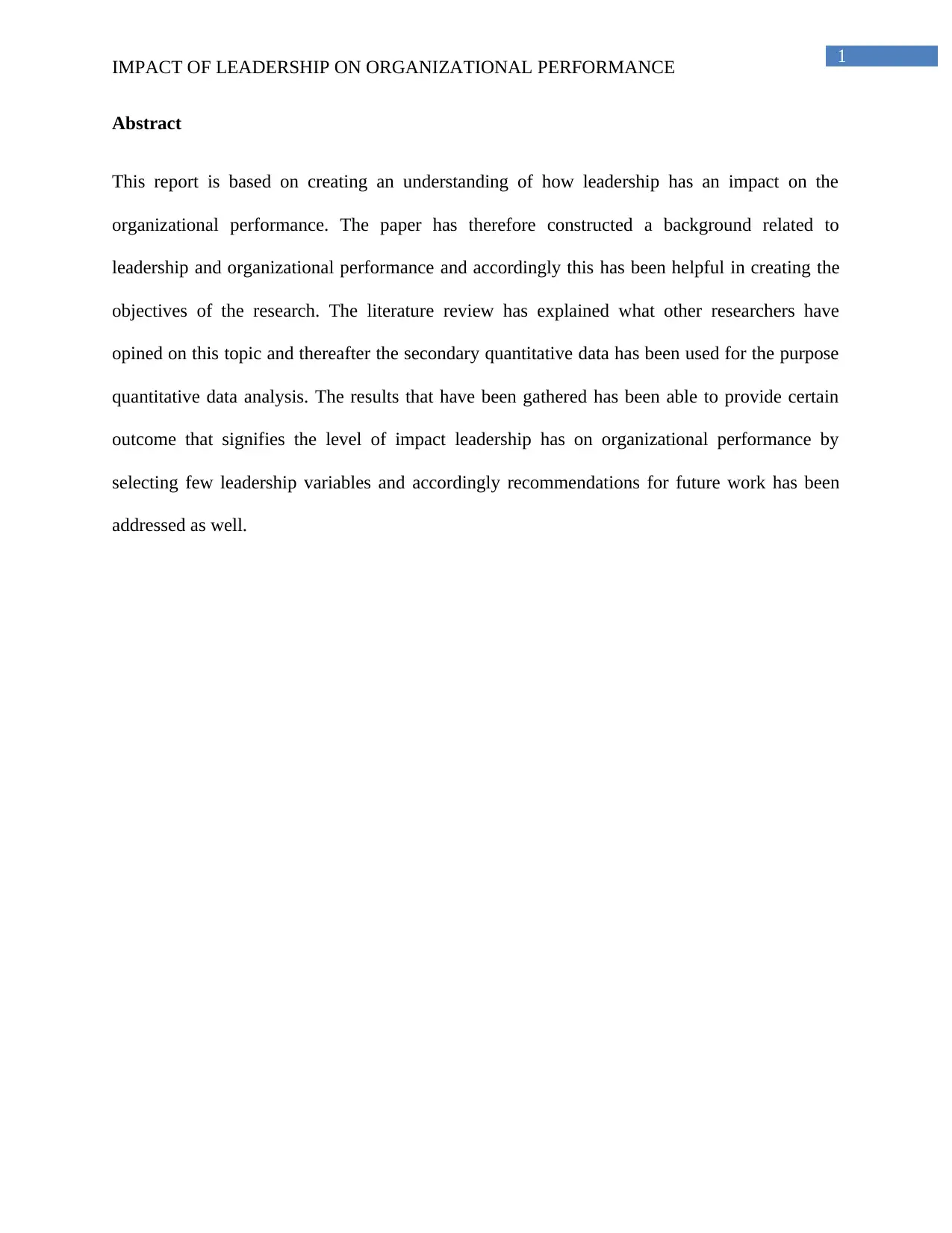
1
IMPACT OF LEADERSHIP ON ORGANIZATIONAL PERFORMANCE
Abstract
This report is based on creating an understanding of how leadership has an impact on the
organizational performance. The paper has therefore constructed a background related to
leadership and organizational performance and accordingly this has been helpful in creating the
objectives of the research. The literature review has explained what other researchers have
opined on this topic and thereafter the secondary quantitative data has been used for the purpose
quantitative data analysis. The results that have been gathered has been able to provide certain
outcome that signifies the level of impact leadership has on organizational performance by
selecting few leadership variables and accordingly recommendations for future work has been
addressed as well.
IMPACT OF LEADERSHIP ON ORGANIZATIONAL PERFORMANCE
Abstract
This report is based on creating an understanding of how leadership has an impact on the
organizational performance. The paper has therefore constructed a background related to
leadership and organizational performance and accordingly this has been helpful in creating the
objectives of the research. The literature review has explained what other researchers have
opined on this topic and thereafter the secondary quantitative data has been used for the purpose
quantitative data analysis. The results that have been gathered has been able to provide certain
outcome that signifies the level of impact leadership has on organizational performance by
selecting few leadership variables and accordingly recommendations for future work has been
addressed as well.
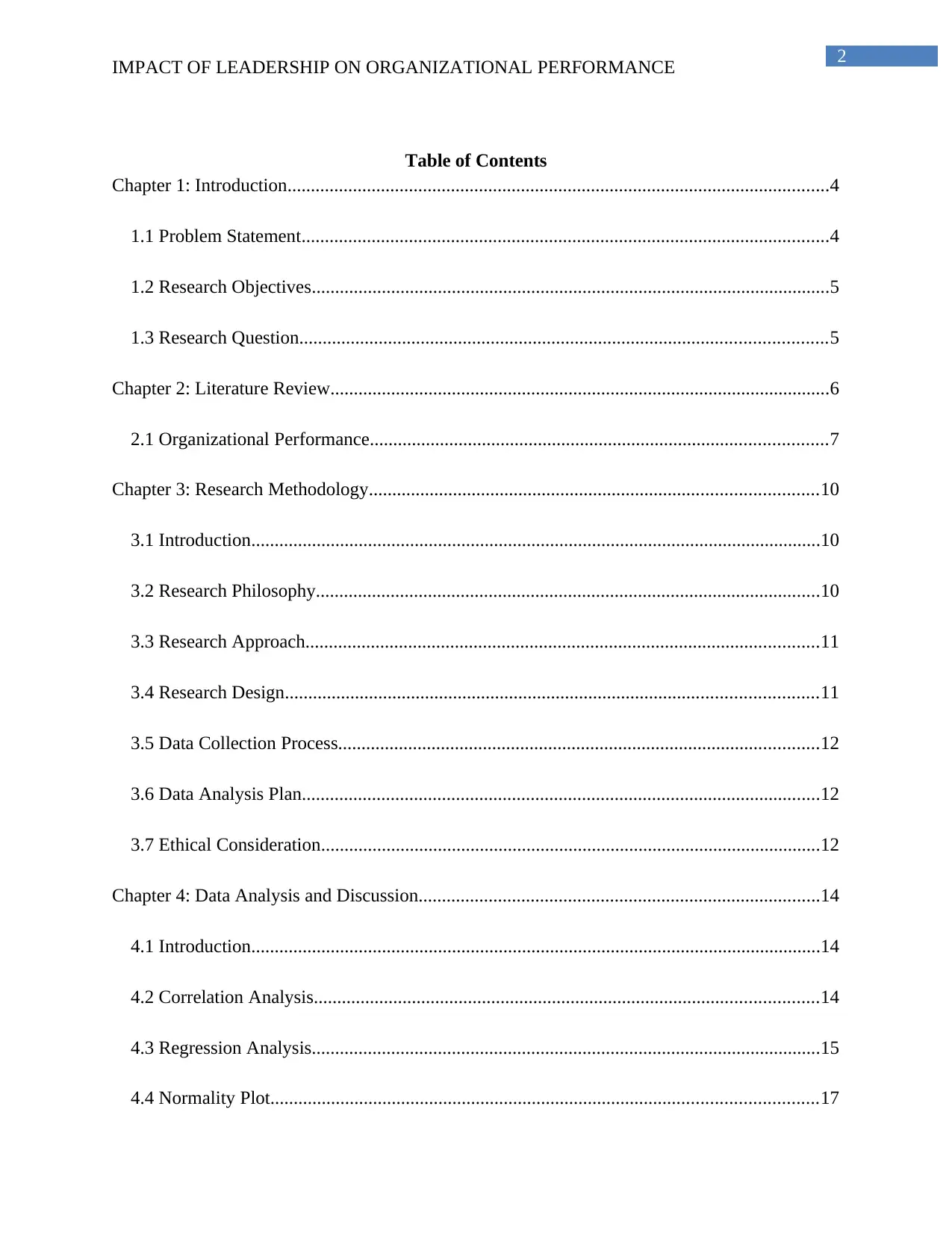
2
IMPACT OF LEADERSHIP ON ORGANIZATIONAL PERFORMANCE
Table of Contents
Chapter 1: Introduction....................................................................................................................4
1.1 Problem Statement.................................................................................................................4
1.2 Research Objectives...............................................................................................................5
1.3 Research Question.................................................................................................................5
Chapter 2: Literature Review...........................................................................................................6
2.1 Organizational Performance..................................................................................................7
Chapter 3: Research Methodology................................................................................................10
3.1 Introduction..........................................................................................................................10
3.2 Research Philosophy............................................................................................................10
3.3 Research Approach..............................................................................................................11
3.4 Research Design..................................................................................................................11
3.5 Data Collection Process.......................................................................................................12
3.6 Data Analysis Plan...............................................................................................................12
3.7 Ethical Consideration...........................................................................................................12
Chapter 4: Data Analysis and Discussion......................................................................................14
4.1 Introduction..........................................................................................................................14
4.2 Correlation Analysis............................................................................................................14
4.3 Regression Analysis.............................................................................................................15
4.4 Normality Plot.....................................................................................................................17
IMPACT OF LEADERSHIP ON ORGANIZATIONAL PERFORMANCE
Table of Contents
Chapter 1: Introduction....................................................................................................................4
1.1 Problem Statement.................................................................................................................4
1.2 Research Objectives...............................................................................................................5
1.3 Research Question.................................................................................................................5
Chapter 2: Literature Review...........................................................................................................6
2.1 Organizational Performance..................................................................................................7
Chapter 3: Research Methodology................................................................................................10
3.1 Introduction..........................................................................................................................10
3.2 Research Philosophy............................................................................................................10
3.3 Research Approach..............................................................................................................11
3.4 Research Design..................................................................................................................11
3.5 Data Collection Process.......................................................................................................12
3.6 Data Analysis Plan...............................................................................................................12
3.7 Ethical Consideration...........................................................................................................12
Chapter 4: Data Analysis and Discussion......................................................................................14
4.1 Introduction..........................................................................................................................14
4.2 Correlation Analysis............................................................................................................14
4.3 Regression Analysis.............................................................................................................15
4.4 Normality Plot.....................................................................................................................17
⊘ This is a preview!⊘
Do you want full access?
Subscribe today to unlock all pages.

Trusted by 1+ million students worldwide
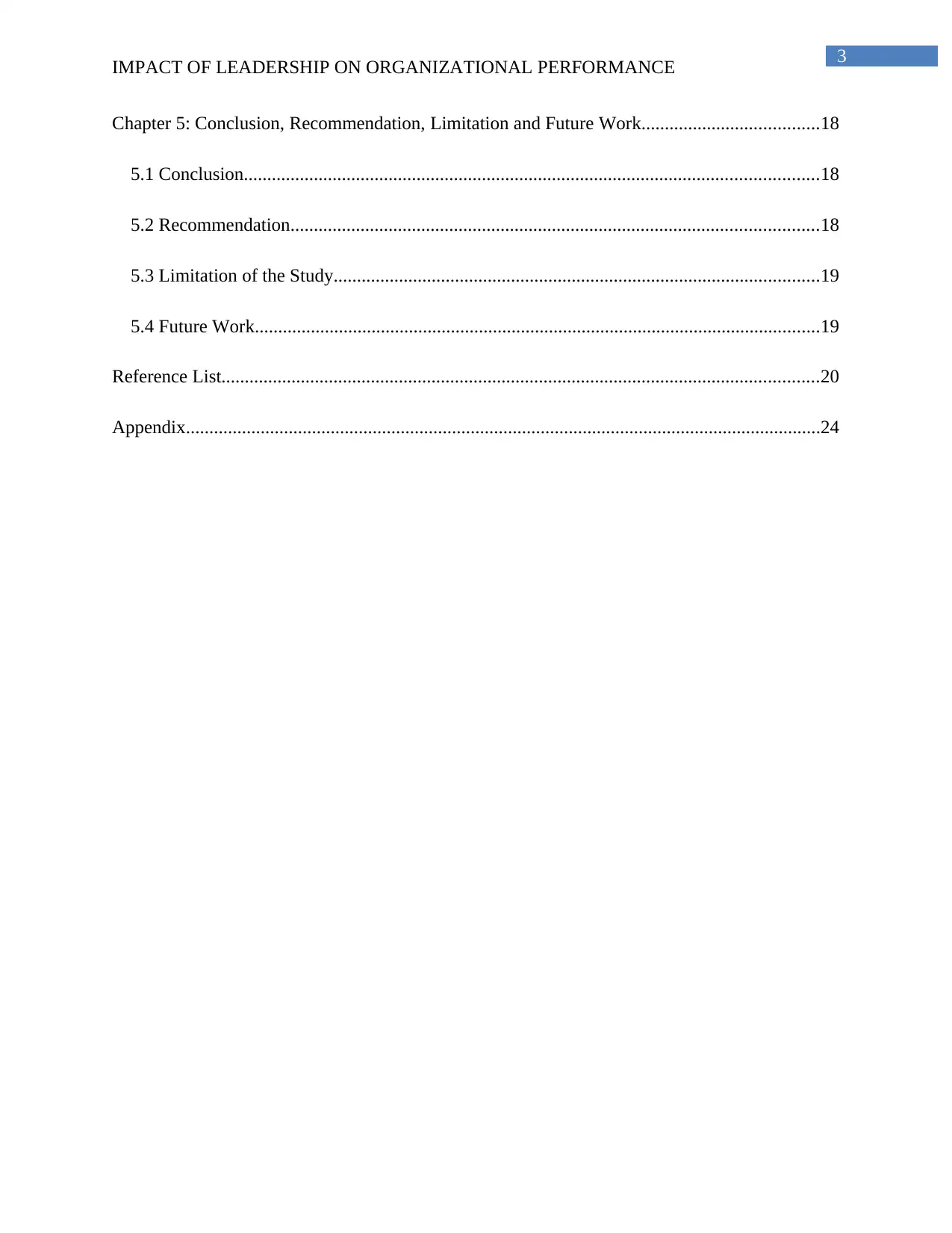
3
IMPACT OF LEADERSHIP ON ORGANIZATIONAL PERFORMANCE
Chapter 5: Conclusion, Recommendation, Limitation and Future Work......................................18
5.1 Conclusion...........................................................................................................................18
5.2 Recommendation.................................................................................................................18
5.3 Limitation of the Study........................................................................................................19
5.4 Future Work.........................................................................................................................19
Reference List................................................................................................................................20
Appendix........................................................................................................................................24
IMPACT OF LEADERSHIP ON ORGANIZATIONAL PERFORMANCE
Chapter 5: Conclusion, Recommendation, Limitation and Future Work......................................18
5.1 Conclusion...........................................................................................................................18
5.2 Recommendation.................................................................................................................18
5.3 Limitation of the Study........................................................................................................19
5.4 Future Work.........................................................................................................................19
Reference List................................................................................................................................20
Appendix........................................................................................................................................24
Paraphrase This Document
Need a fresh take? Get an instant paraphrase of this document with our AI Paraphraser
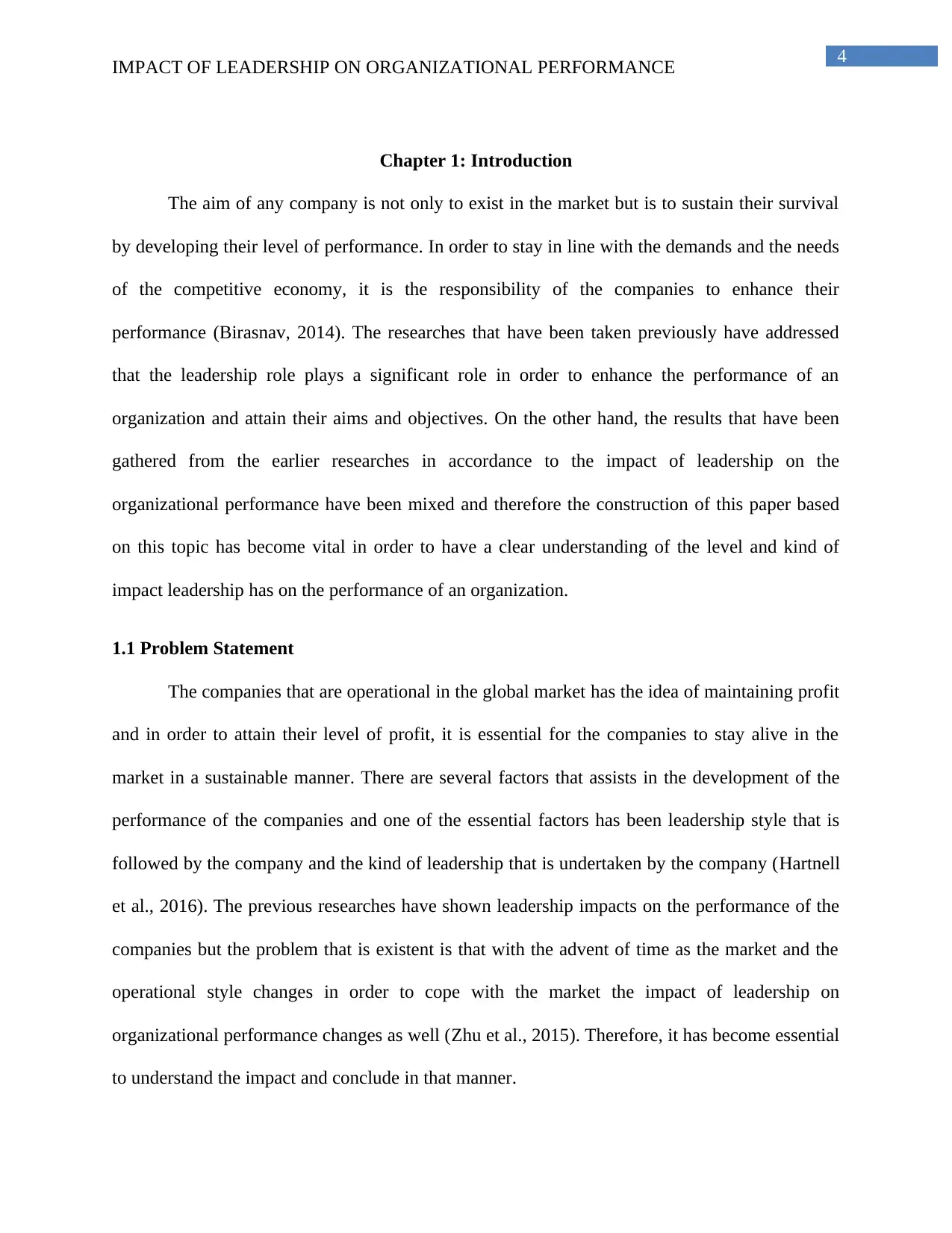
4
IMPACT OF LEADERSHIP ON ORGANIZATIONAL PERFORMANCE
Chapter 1: Introduction
The aim of any company is not only to exist in the market but is to sustain their survival
by developing their level of performance. In order to stay in line with the demands and the needs
of the competitive economy, it is the responsibility of the companies to enhance their
performance (Birasnav, 2014). The researches that have been taken previously have addressed
that the leadership role plays a significant role in order to enhance the performance of an
organization and attain their aims and objectives. On the other hand, the results that have been
gathered from the earlier researches in accordance to the impact of leadership on the
organizational performance have been mixed and therefore the construction of this paper based
on this topic has become vital in order to have a clear understanding of the level and kind of
impact leadership has on the performance of an organization.
1.1 Problem Statement
The companies that are operational in the global market has the idea of maintaining profit
and in order to attain their level of profit, it is essential for the companies to stay alive in the
market in a sustainable manner. There are several factors that assists in the development of the
performance of the companies and one of the essential factors has been leadership style that is
followed by the company and the kind of leadership that is undertaken by the company (Hartnell
et al., 2016). The previous researches have shown leadership impacts on the performance of the
companies but the problem that is existent is that with the advent of time as the market and the
operational style changes in order to cope with the market the impact of leadership on
organizational performance changes as well (Zhu et al., 2015). Therefore, it has become essential
to understand the impact and conclude in that manner.
IMPACT OF LEADERSHIP ON ORGANIZATIONAL PERFORMANCE
Chapter 1: Introduction
The aim of any company is not only to exist in the market but is to sustain their survival
by developing their level of performance. In order to stay in line with the demands and the needs
of the competitive economy, it is the responsibility of the companies to enhance their
performance (Birasnav, 2014). The researches that have been taken previously have addressed
that the leadership role plays a significant role in order to enhance the performance of an
organization and attain their aims and objectives. On the other hand, the results that have been
gathered from the earlier researches in accordance to the impact of leadership on the
organizational performance have been mixed and therefore the construction of this paper based
on this topic has become vital in order to have a clear understanding of the level and kind of
impact leadership has on the performance of an organization.
1.1 Problem Statement
The companies that are operational in the global market has the idea of maintaining profit
and in order to attain their level of profit, it is essential for the companies to stay alive in the
market in a sustainable manner. There are several factors that assists in the development of the
performance of the companies and one of the essential factors has been leadership style that is
followed by the company and the kind of leadership that is undertaken by the company (Hartnell
et al., 2016). The previous researches have shown leadership impacts on the performance of the
companies but the problem that is existent is that with the advent of time as the market and the
operational style changes in order to cope with the market the impact of leadership on
organizational performance changes as well (Zhu et al., 2015). Therefore, it has become essential
to understand the impact and conclude in that manner.
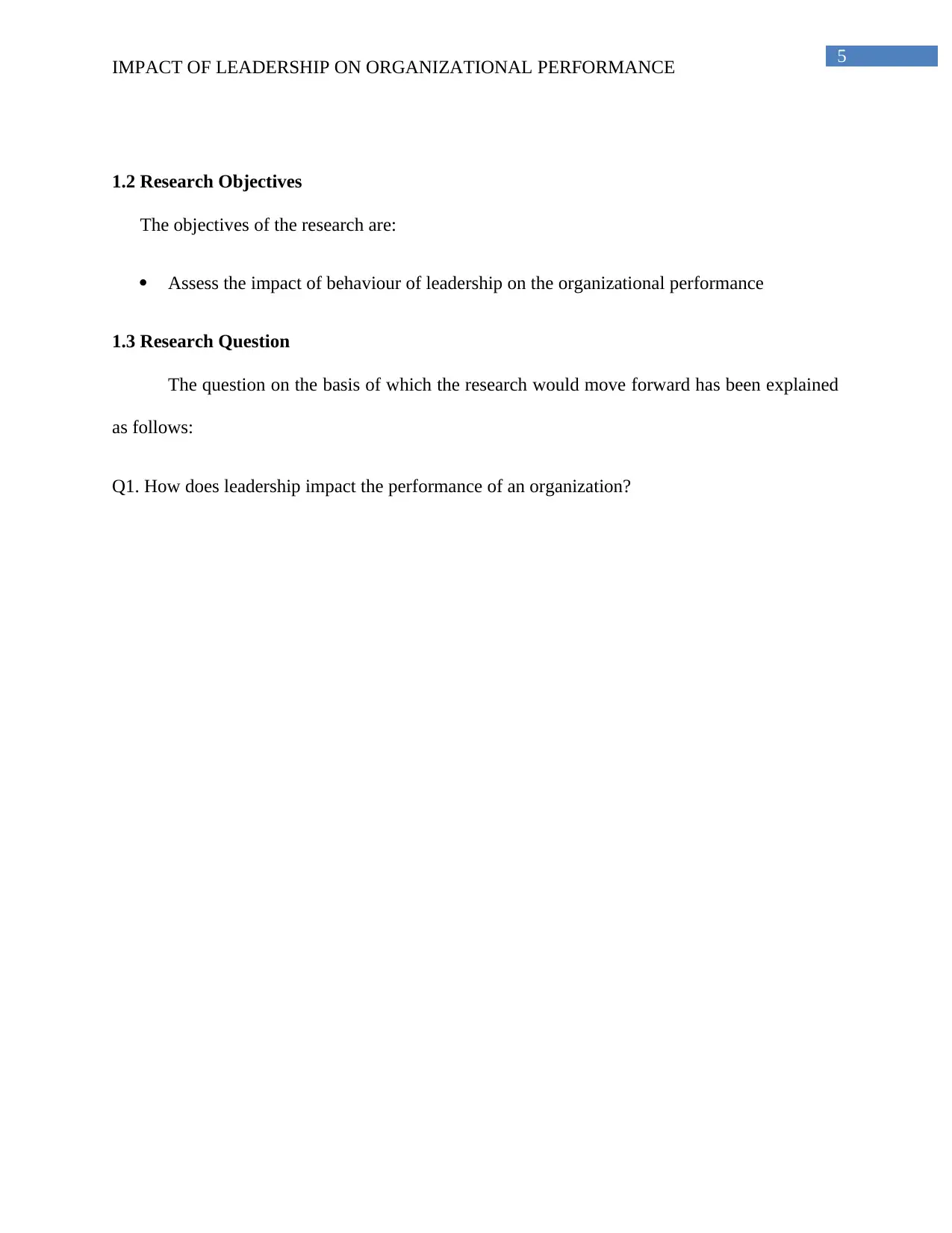
5
IMPACT OF LEADERSHIP ON ORGANIZATIONAL PERFORMANCE
1.2 Research Objectives
The objectives of the research are:
Assess the impact of behaviour of leadership on the organizational performance
1.3 Research Question
The question on the basis of which the research would move forward has been explained
as follows:
Q1. How does leadership impact the performance of an organization?
IMPACT OF LEADERSHIP ON ORGANIZATIONAL PERFORMANCE
1.2 Research Objectives
The objectives of the research are:
Assess the impact of behaviour of leadership on the organizational performance
1.3 Research Question
The question on the basis of which the research would move forward has been explained
as follows:
Q1. How does leadership impact the performance of an organization?
⊘ This is a preview!⊘
Do you want full access?
Subscribe today to unlock all pages.

Trusted by 1+ million students worldwide
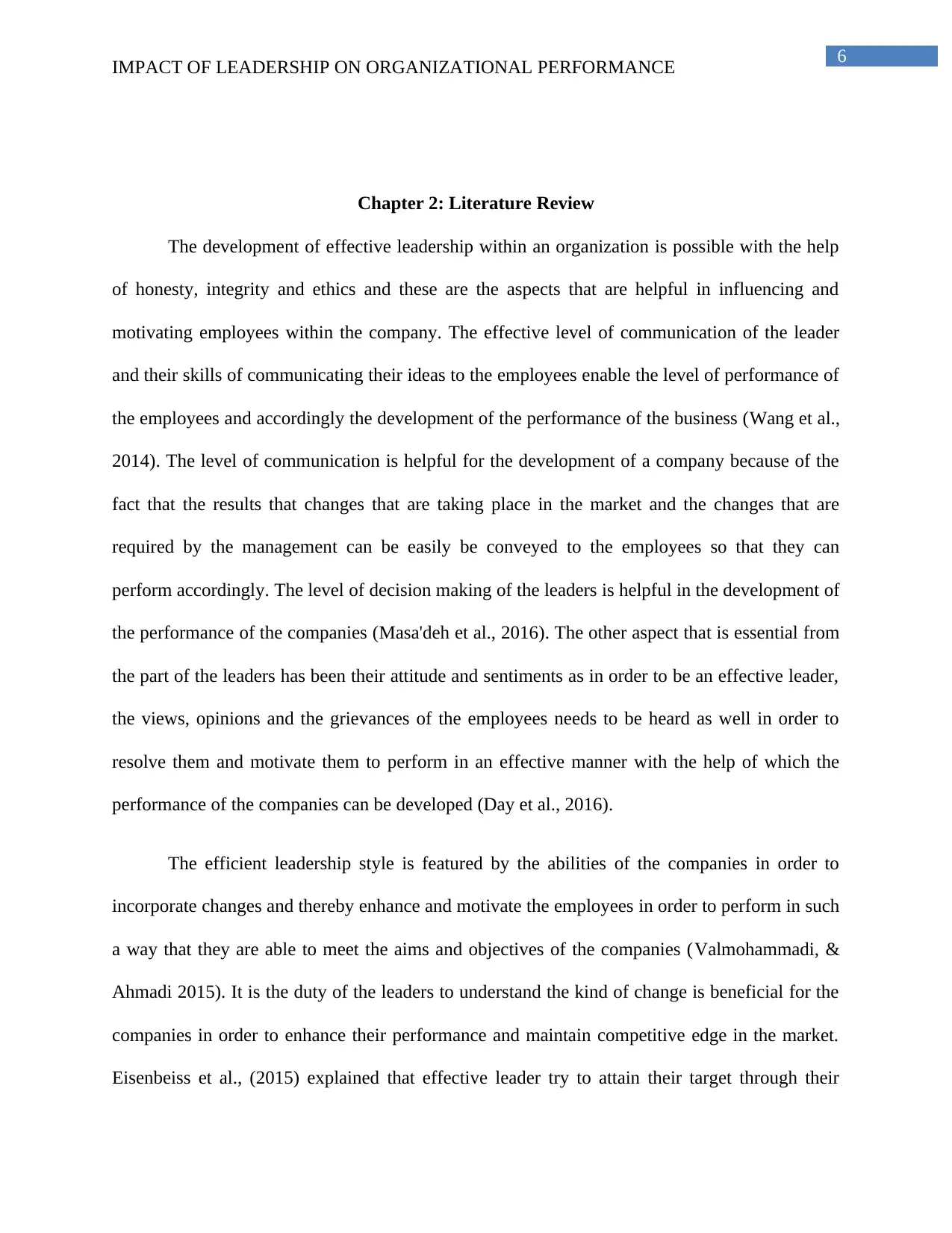
6
IMPACT OF LEADERSHIP ON ORGANIZATIONAL PERFORMANCE
Chapter 2: Literature Review
The development of effective leadership within an organization is possible with the help
of honesty, integrity and ethics and these are the aspects that are helpful in influencing and
motivating employees within the company. The effective level of communication of the leader
and their skills of communicating their ideas to the employees enable the level of performance of
the employees and accordingly the development of the performance of the business (Wang et al.,
2014). The level of communication is helpful for the development of a company because of the
fact that the results that changes that are taking place in the market and the changes that are
required by the management can be easily be conveyed to the employees so that they can
perform accordingly. The level of decision making of the leaders is helpful in the development of
the performance of the companies (Masa'deh et al., 2016). The other aspect that is essential from
the part of the leaders has been their attitude and sentiments as in order to be an effective leader,
the views, opinions and the grievances of the employees needs to be heard as well in order to
resolve them and motivate them to perform in an effective manner with the help of which the
performance of the companies can be developed (Day et al., 2016).
The efficient leadership style is featured by the abilities of the companies in order to
incorporate changes and thereby enhance and motivate the employees in order to perform in such
a way that they are able to meet the aims and objectives of the companies (Valmohammadi, &
Ahmadi 2015). It is the duty of the leaders to understand the kind of change is beneficial for the
companies in order to enhance their performance and maintain competitive edge in the market.
Eisenbeiss et al., (2015) explained that effective leader try to attain their target through their
IMPACT OF LEADERSHIP ON ORGANIZATIONAL PERFORMANCE
Chapter 2: Literature Review
The development of effective leadership within an organization is possible with the help
of honesty, integrity and ethics and these are the aspects that are helpful in influencing and
motivating employees within the company. The effective level of communication of the leader
and their skills of communicating their ideas to the employees enable the level of performance of
the employees and accordingly the development of the performance of the business (Wang et al.,
2014). The level of communication is helpful for the development of a company because of the
fact that the results that changes that are taking place in the market and the changes that are
required by the management can be easily be conveyed to the employees so that they can
perform accordingly. The level of decision making of the leaders is helpful in the development of
the performance of the companies (Masa'deh et al., 2016). The other aspect that is essential from
the part of the leaders has been their attitude and sentiments as in order to be an effective leader,
the views, opinions and the grievances of the employees needs to be heard as well in order to
resolve them and motivate them to perform in an effective manner with the help of which the
performance of the companies can be developed (Day et al., 2016).
The efficient leadership style is featured by the abilities of the companies in order to
incorporate changes and thereby enhance and motivate the employees in order to perform in such
a way that they are able to meet the aims and objectives of the companies (Valmohammadi, &
Ahmadi 2015). It is the duty of the leaders to understand the kind of change is beneficial for the
companies in order to enhance their performance and maintain competitive edge in the market.
Eisenbeiss et al., (2015) explained that effective leader try to attain their target through their
Paraphrase This Document
Need a fresh take? Get an instant paraphrase of this document with our AI Paraphraser
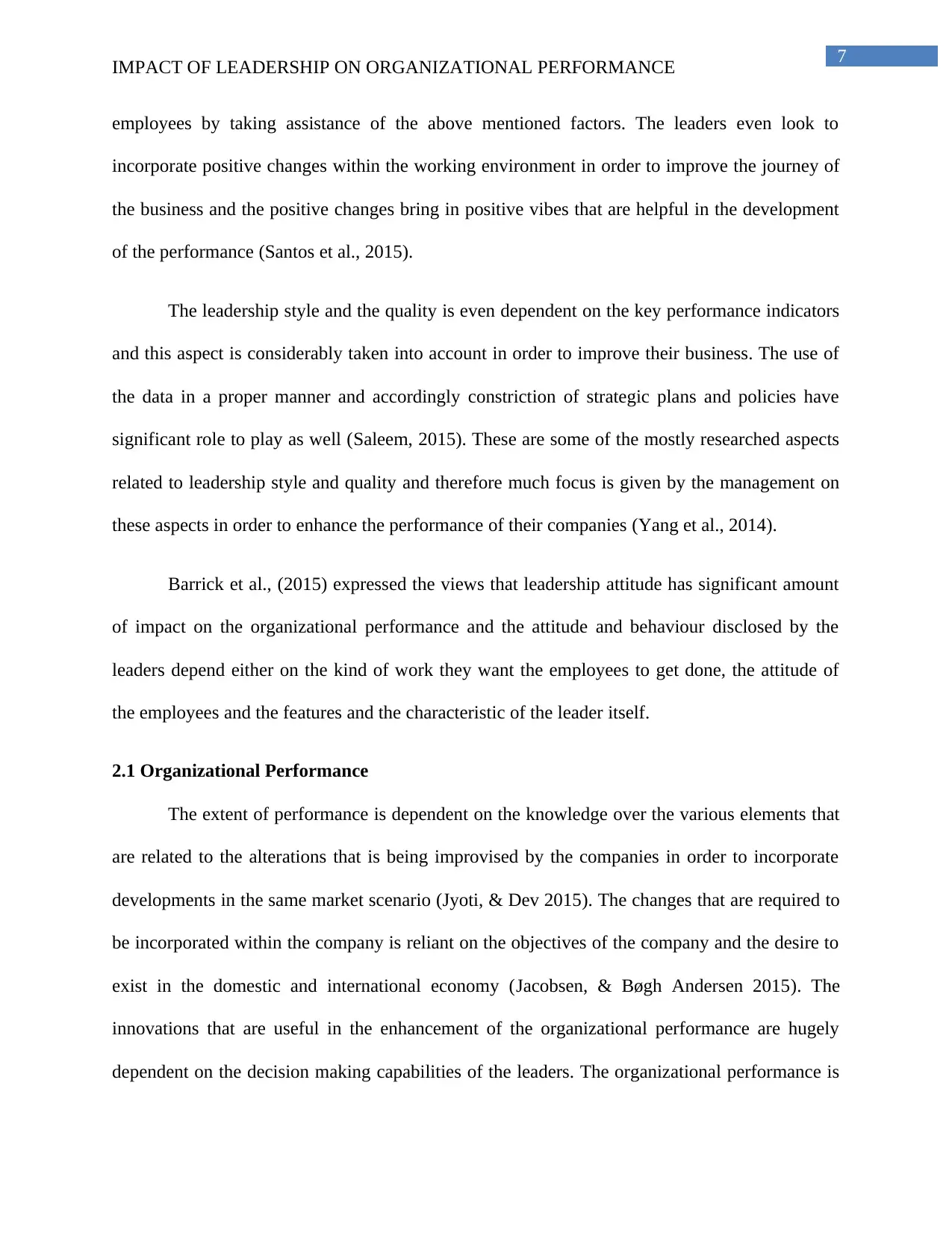
7
IMPACT OF LEADERSHIP ON ORGANIZATIONAL PERFORMANCE
employees by taking assistance of the above mentioned factors. The leaders even look to
incorporate positive changes within the working environment in order to improve the journey of
the business and the positive changes bring in positive vibes that are helpful in the development
of the performance (Santos et al., 2015).
The leadership style and the quality is even dependent on the key performance indicators
and this aspect is considerably taken into account in order to improve their business. The use of
the data in a proper manner and accordingly constriction of strategic plans and policies have
significant role to play as well (Saleem, 2015). These are some of the mostly researched aspects
related to leadership style and quality and therefore much focus is given by the management on
these aspects in order to enhance the performance of their companies (Yang et al., 2014).
Barrick et al., (2015) expressed the views that leadership attitude has significant amount
of impact on the organizational performance and the attitude and behaviour disclosed by the
leaders depend either on the kind of work they want the employees to get done, the attitude of
the employees and the features and the characteristic of the leader itself.
2.1 Organizational Performance
The extent of performance is dependent on the knowledge over the various elements that
are related to the alterations that is being improvised by the companies in order to incorporate
developments in the same market scenario (Jyoti, & Dev 2015). The changes that are required to
be incorporated within the company is reliant on the objectives of the company and the desire to
exist in the domestic and international economy (Jacobsen, & Bøgh Andersen 2015). The
innovations that are useful in the enhancement of the organizational performance are hugely
dependent on the decision making capabilities of the leaders. The organizational performance is
IMPACT OF LEADERSHIP ON ORGANIZATIONAL PERFORMANCE
employees by taking assistance of the above mentioned factors. The leaders even look to
incorporate positive changes within the working environment in order to improve the journey of
the business and the positive changes bring in positive vibes that are helpful in the development
of the performance (Santos et al., 2015).
The leadership style and the quality is even dependent on the key performance indicators
and this aspect is considerably taken into account in order to improve their business. The use of
the data in a proper manner and accordingly constriction of strategic plans and policies have
significant role to play as well (Saleem, 2015). These are some of the mostly researched aspects
related to leadership style and quality and therefore much focus is given by the management on
these aspects in order to enhance the performance of their companies (Yang et al., 2014).
Barrick et al., (2015) expressed the views that leadership attitude has significant amount
of impact on the organizational performance and the attitude and behaviour disclosed by the
leaders depend either on the kind of work they want the employees to get done, the attitude of
the employees and the features and the characteristic of the leader itself.
2.1 Organizational Performance
The extent of performance is dependent on the knowledge over the various elements that
are related to the alterations that is being improvised by the companies in order to incorporate
developments in the same market scenario (Jyoti, & Dev 2015). The changes that are required to
be incorporated within the company is reliant on the objectives of the company and the desire to
exist in the domestic and international economy (Jacobsen, & Bøgh Andersen 2015). The
innovations that are useful in the enhancement of the organizational performance are hugely
dependent on the decision making capabilities of the leaders. The organizational performance is
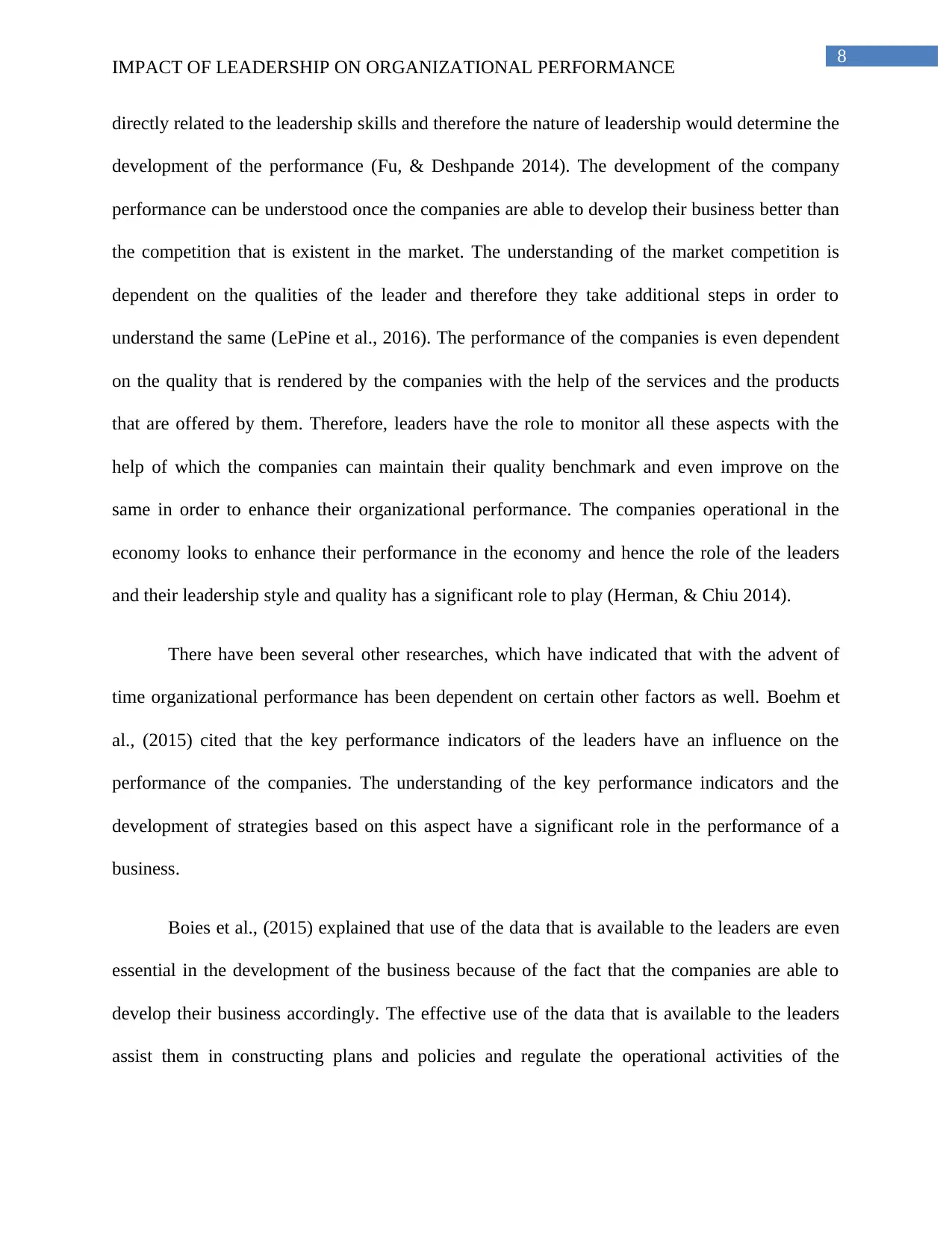
8
IMPACT OF LEADERSHIP ON ORGANIZATIONAL PERFORMANCE
directly related to the leadership skills and therefore the nature of leadership would determine the
development of the performance (Fu, & Deshpande 2014). The development of the company
performance can be understood once the companies are able to develop their business better than
the competition that is existent in the market. The understanding of the market competition is
dependent on the qualities of the leader and therefore they take additional steps in order to
understand the same (LePine et al., 2016). The performance of the companies is even dependent
on the quality that is rendered by the companies with the help of the services and the products
that are offered by them. Therefore, leaders have the role to monitor all these aspects with the
help of which the companies can maintain their quality benchmark and even improve on the
same in order to enhance their organizational performance. The companies operational in the
economy looks to enhance their performance in the economy and hence the role of the leaders
and their leadership style and quality has a significant role to play (Herman, & Chiu 2014).
There have been several other researches, which have indicated that with the advent of
time organizational performance has been dependent on certain other factors as well. Boehm et
al., (2015) cited that the key performance indicators of the leaders have an influence on the
performance of the companies. The understanding of the key performance indicators and the
development of strategies based on this aspect have a significant role in the performance of a
business.
Boies et al., (2015) explained that use of the data that is available to the leaders are even
essential in the development of the business because of the fact that the companies are able to
develop their business accordingly. The effective use of the data that is available to the leaders
assist them in constructing plans and policies and regulate the operational activities of the
IMPACT OF LEADERSHIP ON ORGANIZATIONAL PERFORMANCE
directly related to the leadership skills and therefore the nature of leadership would determine the
development of the performance (Fu, & Deshpande 2014). The development of the company
performance can be understood once the companies are able to develop their business better than
the competition that is existent in the market. The understanding of the market competition is
dependent on the qualities of the leader and therefore they take additional steps in order to
understand the same (LePine et al., 2016). The performance of the companies is even dependent
on the quality that is rendered by the companies with the help of the services and the products
that are offered by them. Therefore, leaders have the role to monitor all these aspects with the
help of which the companies can maintain their quality benchmark and even improve on the
same in order to enhance their organizational performance. The companies operational in the
economy looks to enhance their performance in the economy and hence the role of the leaders
and their leadership style and quality has a significant role to play (Herman, & Chiu 2014).
There have been several other researches, which have indicated that with the advent of
time organizational performance has been dependent on certain other factors as well. Boehm et
al., (2015) cited that the key performance indicators of the leaders have an influence on the
performance of the companies. The understanding of the key performance indicators and the
development of strategies based on this aspect have a significant role in the performance of a
business.
Boies et al., (2015) explained that use of the data that is available to the leaders are even
essential in the development of the business because of the fact that the companies are able to
develop their business accordingly. The effective use of the data that is available to the leaders
assist them in constructing plans and policies and regulate the operational activities of the
⊘ This is a preview!⊘
Do you want full access?
Subscribe today to unlock all pages.

Trusted by 1+ million students worldwide
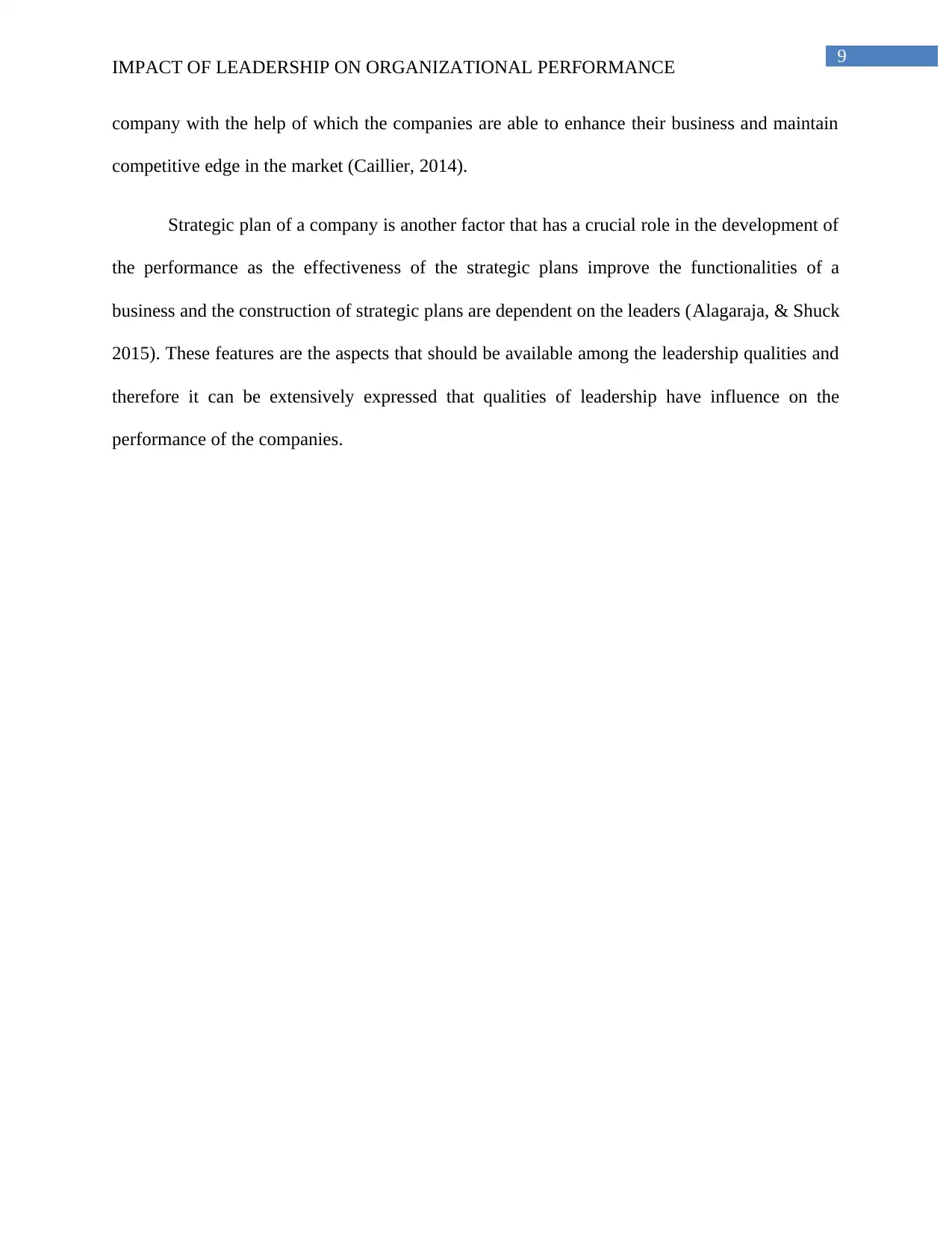
9
IMPACT OF LEADERSHIP ON ORGANIZATIONAL PERFORMANCE
company with the help of which the companies are able to enhance their business and maintain
competitive edge in the market (Caillier, 2014).
Strategic plan of a company is another factor that has a crucial role in the development of
the performance as the effectiveness of the strategic plans improve the functionalities of a
business and the construction of strategic plans are dependent on the leaders (Alagaraja, & Shuck
2015). These features are the aspects that should be available among the leadership qualities and
therefore it can be extensively expressed that qualities of leadership have influence on the
performance of the companies.
IMPACT OF LEADERSHIP ON ORGANIZATIONAL PERFORMANCE
company with the help of which the companies are able to enhance their business and maintain
competitive edge in the market (Caillier, 2014).
Strategic plan of a company is another factor that has a crucial role in the development of
the performance as the effectiveness of the strategic plans improve the functionalities of a
business and the construction of strategic plans are dependent on the leaders (Alagaraja, & Shuck
2015). These features are the aspects that should be available among the leadership qualities and
therefore it can be extensively expressed that qualities of leadership have influence on the
performance of the companies.
Paraphrase This Document
Need a fresh take? Get an instant paraphrase of this document with our AI Paraphraser
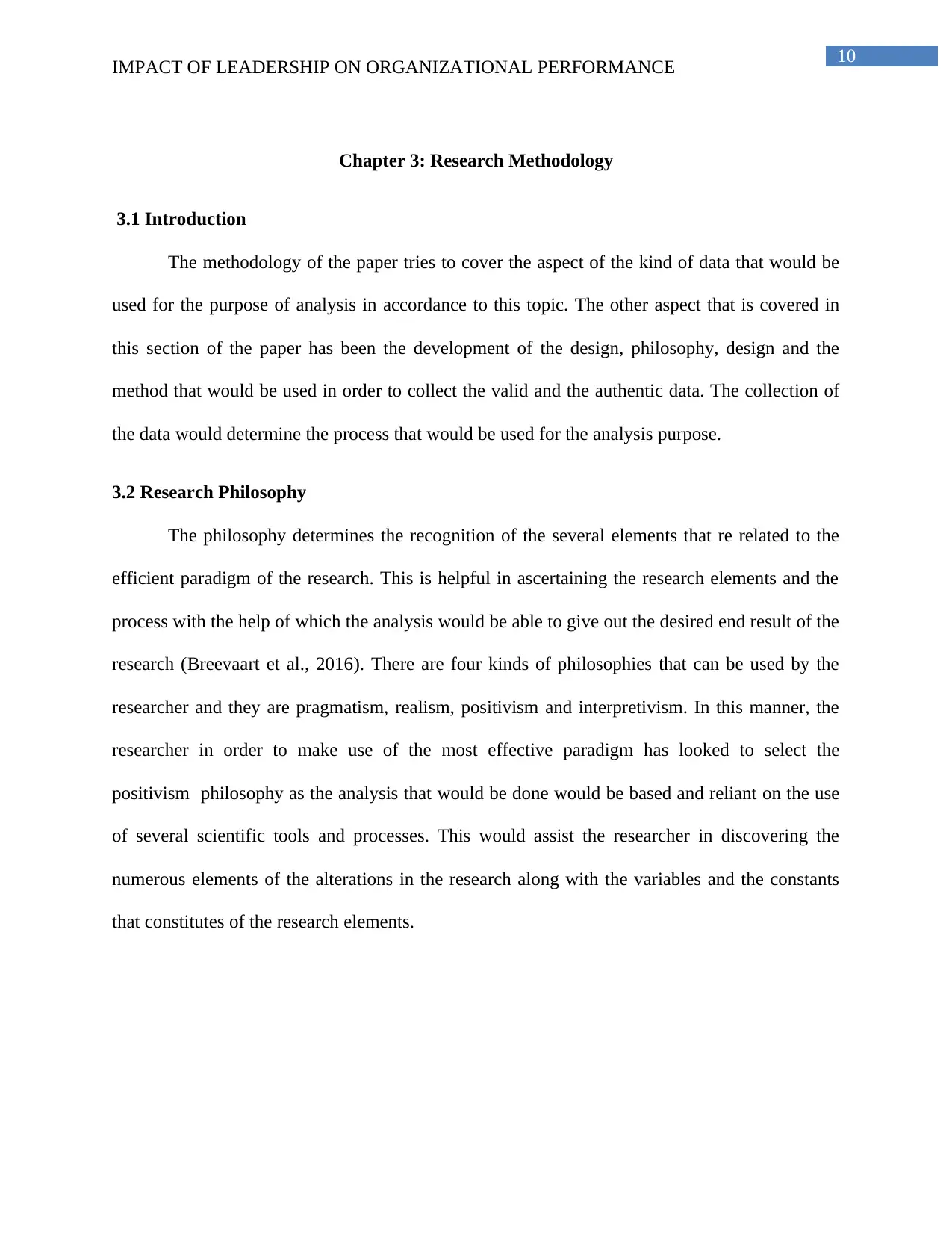
10
IMPACT OF LEADERSHIP ON ORGANIZATIONAL PERFORMANCE
Chapter 3: Research Methodology
3.1 Introduction
The methodology of the paper tries to cover the aspect of the kind of data that would be
used for the purpose of analysis in accordance to this topic. The other aspect that is covered in
this section of the paper has been the development of the design, philosophy, design and the
method that would be used in order to collect the valid and the authentic data. The collection of
the data would determine the process that would be used for the analysis purpose.
3.2 Research Philosophy
The philosophy determines the recognition of the several elements that re related to the
efficient paradigm of the research. This is helpful in ascertaining the research elements and the
process with the help of which the analysis would be able to give out the desired end result of the
research (Breevaart et al., 2016). There are four kinds of philosophies that can be used by the
researcher and they are pragmatism, realism, positivism and interpretivism. In this manner, the
researcher in order to make use of the most effective paradigm has looked to select the
positivism philosophy as the analysis that would be done would be based and reliant on the use
of several scientific tools and processes. This would assist the researcher in discovering the
numerous elements of the alterations in the research along with the variables and the constants
that constitutes of the research elements.
IMPACT OF LEADERSHIP ON ORGANIZATIONAL PERFORMANCE
Chapter 3: Research Methodology
3.1 Introduction
The methodology of the paper tries to cover the aspect of the kind of data that would be
used for the purpose of analysis in accordance to this topic. The other aspect that is covered in
this section of the paper has been the development of the design, philosophy, design and the
method that would be used in order to collect the valid and the authentic data. The collection of
the data would determine the process that would be used for the analysis purpose.
3.2 Research Philosophy
The philosophy determines the recognition of the several elements that re related to the
efficient paradigm of the research. This is helpful in ascertaining the research elements and the
process with the help of which the analysis would be able to give out the desired end result of the
research (Breevaart et al., 2016). There are four kinds of philosophies that can be used by the
researcher and they are pragmatism, realism, positivism and interpretivism. In this manner, the
researcher in order to make use of the most effective paradigm has looked to select the
positivism philosophy as the analysis that would be done would be based and reliant on the use
of several scientific tools and processes. This would assist the researcher in discovering the
numerous elements of the alterations in the research along with the variables and the constants
that constitutes of the research elements.
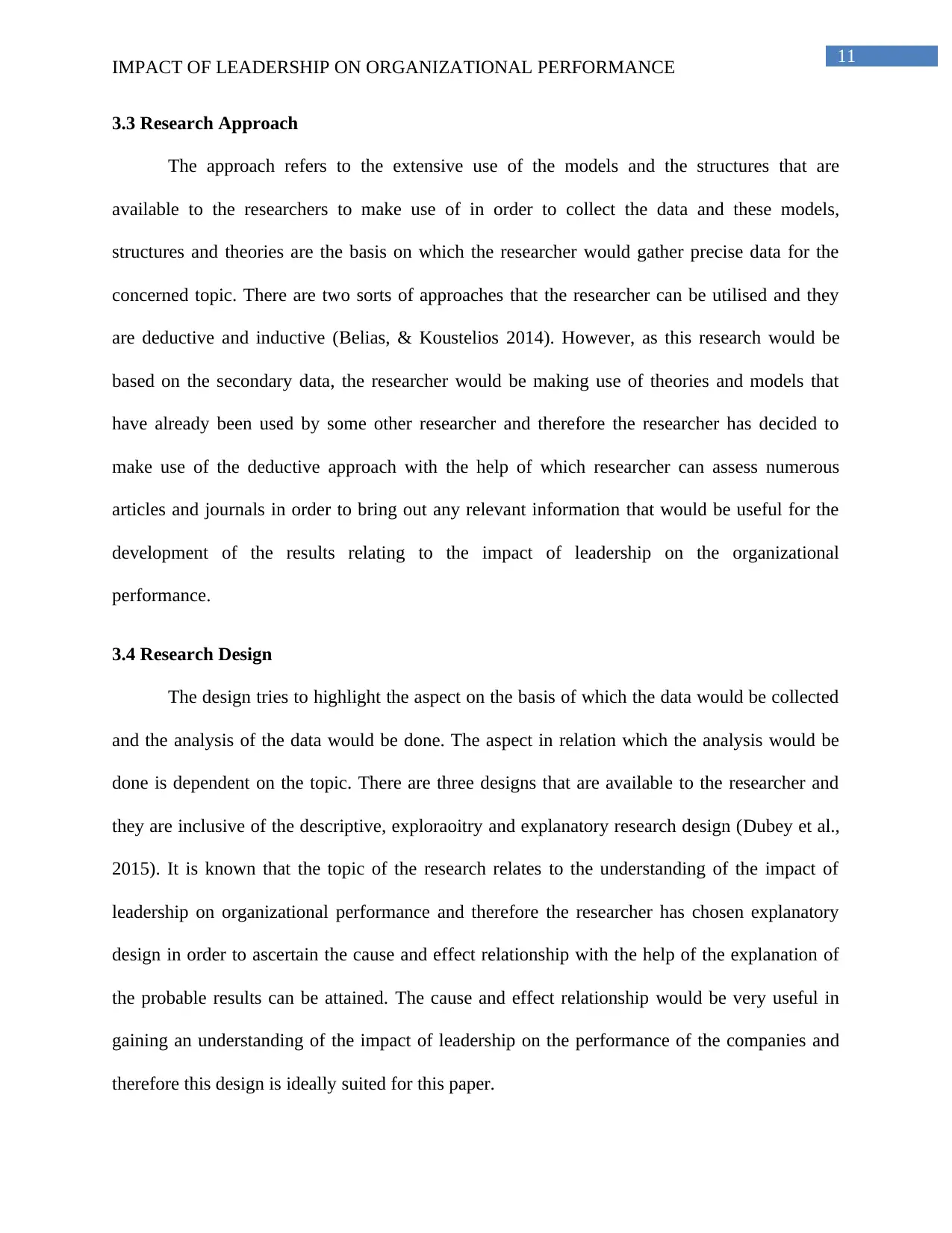
11
IMPACT OF LEADERSHIP ON ORGANIZATIONAL PERFORMANCE
3.3 Research Approach
The approach refers to the extensive use of the models and the structures that are
available to the researchers to make use of in order to collect the data and these models,
structures and theories are the basis on which the researcher would gather precise data for the
concerned topic. There are two sorts of approaches that the researcher can be utilised and they
are deductive and inductive (Belias, & Koustelios 2014). However, as this research would be
based on the secondary data, the researcher would be making use of theories and models that
have already been used by some other researcher and therefore the researcher has decided to
make use of the deductive approach with the help of which researcher can assess numerous
articles and journals in order to bring out any relevant information that would be useful for the
development of the results relating to the impact of leadership on the organizational
performance.
3.4 Research Design
The design tries to highlight the aspect on the basis of which the data would be collected
and the analysis of the data would be done. The aspect in relation which the analysis would be
done is dependent on the topic. There are three designs that are available to the researcher and
they are inclusive of the descriptive, exploraoitry and explanatory research design (Dubey et al.,
2015). It is known that the topic of the research relates to the understanding of the impact of
leadership on organizational performance and therefore the researcher has chosen explanatory
design in order to ascertain the cause and effect relationship with the help of the explanation of
the probable results can be attained. The cause and effect relationship would be very useful in
gaining an understanding of the impact of leadership on the performance of the companies and
therefore this design is ideally suited for this paper.
IMPACT OF LEADERSHIP ON ORGANIZATIONAL PERFORMANCE
3.3 Research Approach
The approach refers to the extensive use of the models and the structures that are
available to the researchers to make use of in order to collect the data and these models,
structures and theories are the basis on which the researcher would gather precise data for the
concerned topic. There are two sorts of approaches that the researcher can be utilised and they
are deductive and inductive (Belias, & Koustelios 2014). However, as this research would be
based on the secondary data, the researcher would be making use of theories and models that
have already been used by some other researcher and therefore the researcher has decided to
make use of the deductive approach with the help of which researcher can assess numerous
articles and journals in order to bring out any relevant information that would be useful for the
development of the results relating to the impact of leadership on the organizational
performance.
3.4 Research Design
The design tries to highlight the aspect on the basis of which the data would be collected
and the analysis of the data would be done. The aspect in relation which the analysis would be
done is dependent on the topic. There are three designs that are available to the researcher and
they are inclusive of the descriptive, exploraoitry and explanatory research design (Dubey et al.,
2015). It is known that the topic of the research relates to the understanding of the impact of
leadership on organizational performance and therefore the researcher has chosen explanatory
design in order to ascertain the cause and effect relationship with the help of the explanation of
the probable results can be attained. The cause and effect relationship would be very useful in
gaining an understanding of the impact of leadership on the performance of the companies and
therefore this design is ideally suited for this paper.
⊘ This is a preview!⊘
Do you want full access?
Subscribe today to unlock all pages.

Trusted by 1+ million students worldwide
1 out of 25
Related Documents
Your All-in-One AI-Powered Toolkit for Academic Success.
+13062052269
info@desklib.com
Available 24*7 on WhatsApp / Email
![[object Object]](/_next/static/media/star-bottom.7253800d.svg)
Unlock your academic potential
Copyright © 2020–2026 A2Z Services. All Rights Reserved. Developed and managed by ZUCOL.





